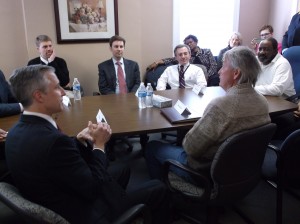Governor visits SOP partner: Center for High Blood Pressure

Virginia Gov. Terry McAuliffe is learning about the critical roles clinical pharmacy plays in health care. The governor paid a visit to Richmond’s Center for High Blood Pressure March 27, accompanied by Secretary of Health and Human Resources William Hazel; Del. Betsy Carr; D-Richmond; and Del. Delores McQuinn, D-Richmond.
The group was interested in hearing about the challenges facing patients without health insurance and the practitioners who care for them.
At the Center for High Blood Pressure, School of Pharmacy faculty members care for patients under a collaborative practice agreement with the clinical medical director. Through this collaborative agreement, pharmacy faculty members educate residents and students to co-manage hypertension, diabetes and hyperlipidemia with their physician partners.
The governor talked with both patients and providers, said SOP associate professor Evan Sisson. “We described our collaborative practice model and suggested that the current fee-for-service reimbursement structure in Virginia limits more widespread primary care adoption.

“Secretary Hazel indicated that a key provision of the expanded Medicaid proposal from the governor includes a medical home model and a managed-care form of reimbursement. Dr. Hazel said, ‘We do not care what players are on the field; we want to pay for outcomes achieved.’ ”
SOP assistant professor Dave Dixon said, “The visit went very well, and the governor was impressed by the quality of patient care and education provided.”
McAuliffe was accompanied on a tour of the center by fourth-year SOP Pharm.D. students Jay Patel and Whitney Webb as well as alumnus Lauren Caldas (Pharm.D. ’11), whose 2011-12 community pharmacy practice residency included a three-month stint at the Center for High Blood Pressure.
A statement from the Center for High Blood Pressure noted that the center’s board members appreciate the interest and commitment shown by state leaders in finding ways to help the uninsured get the health care they need.
More from the Center for High Blood Pressure:
- The most important thing the center does is prevent catastrophic events such as strokes, heart attacks and kidney failure. First-year cost for the average stroke is $67,000.
- Most of the center’s patients would qualify for Medicaid if it were expanded to include those at 134 percent of the Federal Poverty Level.

Gov. Terry McAuliffe (left) is briefed by Center for High Blood Pressure executive director Davd Baldwin (facing away from camera) along with Secretary for Health and Human Resources William Hazel (center), center medical director Daniel Carl and Alan Dow, VCU assistant vice president of health sciences for interprofessional education and collaborative care. - If expanding Medicaid means more health care services for patients, the center supports it.
- The center’s 900 at-risk, uninsured patients receive more than 7,600 services each year. Last year, patients contributed $22,000 toward their own care. They want to pay their fair share.
- Sixty percent of the center’s patients work, 20 percent are actively seeking work and 20 percent have a disability that prevents them from working fulltime but does not qualify them for Medicaid.
- Since 2008, the center has provided more than $3 million worth of free medications to its patients.
- Center for High Blood Pressure leadership believes the center plays a vital role in the Greater Richmond health-care community. The center is working to evolve as the Affordable Care Act continues to be implemented. The eventual goal is to provide a continuum of service to the uninsured, transitioning insured and newly insured.
- The center is working to be a relevant and sustaining service provider to patients who need care, uninsured or not.
- The average annual cost for preventive care, under the insurance expansion, is $1,000. The center can treat a patient for one year at a cost of $364.
Categories Alumni news, Faculty news, Preceptors, Student news
